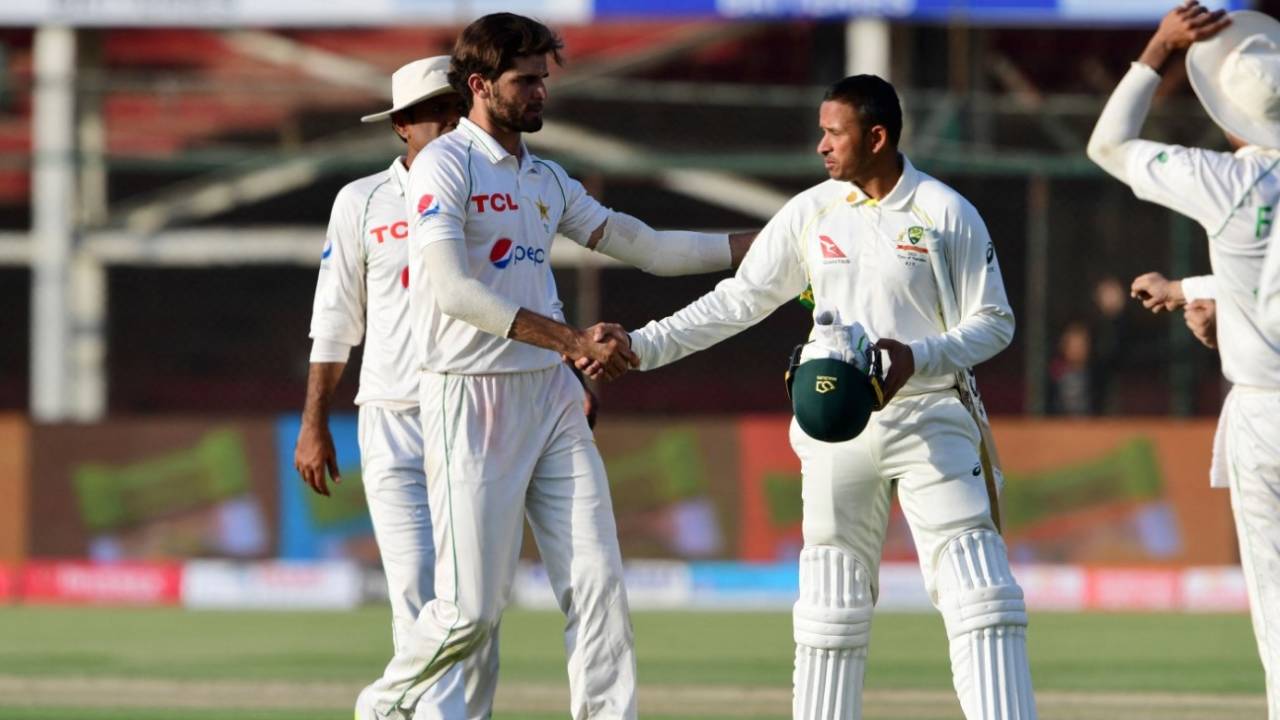If there is one thing you know about Pakistan cricket, it is that just about everyone in a position of influence respects Australian cricket. The Prime Minister wants to copy their domestic structure. The chairman wants to reproduce their pitches. And of course, their aggression, which, when the chairman says it, can mean almost anything you want it to mean.
And the captain called them the "best side in the world". Which may be technically true, but you just know
Babar Azam didn't spend any time looking at the ICC rankings website before uttering those words. He was instead speaking what is imprinted on the psyche of Pakistan cricket supporters: a collective belief in Australian supremacy.
There is merit to most of those points, of course, but idolising a cricket structure to that distinctly odd level of worship is perhaps less than ideal when you have to play the side you have placed on that pedestal. And when, two sessions into a Test match that was still nip and tuck, Pakistan walked out onto the field alongside
Usman Khawaja and
Steven Smith, it felt inescapably like Pakistan didn't just revere Australia, they also feared them.
The game - a Test match, remember - was just 54 overs old. The last 13 overs - ten of which were bowled by seamers - had allowed just 16 runs, and Pakistan had begun to wrest back some of the control they had ceded to a brisk start by Australia's openers. The destination of the first day's spoils felt very much like it was yet to be determined in what should have been an absorbing final session.
Rather, as it turned out, Australia didn't have to fight for those spoils so much as they watched them handed over meekly on a golden platter. Gone, completely, were Shaheen Afridi and Faheem Ashraf who had asphyxiated the visitors before tea. Absent too was Hasan Ali, at a time when the aging ball should have given him the greatest opportunity to go searching for reverse swing.
Instead, a small pocket of fans watched bemused as Babar let Sajid Khan, the most expensive bowler on the day, bowl alongside Nauman Ali, who had been about as incisive as a newborn's teeth. Even Azhar Ali and Babar himself would come on to bowl as Pakistan locked their quicker bowlers out of the game in wait for the second new ball. On just five occasions have Pakistan bowled more spin inside the first 80 overs of a Test in Pakistan.
Mohammad Rizwan, who emerged for the post-match presser, perhaps for no other reason than because he might have drawn the shortest straw, explained that Pakistan had been worried about Australia's brisk scoring rate.
"They won the toss, which was quite important," he said. "They have capitalised on winning the toss and batting first. They scored runs with the new ball. The pitch was dry. They capitalised on that by putting on 100 runs in the first session. We had to dry the runs. This is not negativity.
"A lot of teams employ this tactic, and I thought our bowlers came back very well. You should play according to the way the situation demands. Their run rate was very good because they played well in the first session, and we had to dry the runs."
"The pitch is similarly slow [to Rawalpindi]. But I think it will offer turn and will produce a result because it will offer help to spinners"
Mohammad Rizwan defended his bowlers after the first day's play
There was merit to that, though Afridi and Faheem had pulled things back fairly well in the hour before tea. It had been a stiflingly hot day, and Babar's desire to keep his attack fresh for the new ball was evident. However, having the extra seamer in Ashraf, an option they did not have in Rawalpindi, meant the pace bowlers were never in serious danger of being overworked. But with Australia up against them and the memory of that belligerent first session fresh in their mind, Pakistan reverted immediately to what came naturally against Australia: timorous self-preservation.
Rizwan defended the bowlers, but insisted Test cricket sometimes called for flexibility in approach. "Test cricket is such where sometimes, they'll have the ascendancy and other times us. We tried, but sometimes you don't get any assistance from the pitch no matter what you do," he said.
"Our bowlers tried really hard. Shaheen Afridi tried to go short to the batters but he wasn't getting anything. The situation doesn't always go your way. The pitch is similarly slow [to Rawalpindi]. But I think it will offer turn and I think it will produce a result because it will offer help to the spinners."
Unless there is a remarkable inversion of history, that result - should it come - is most likely an Australian win. In 17 games where Australia have posted in excess of 350 while batting first against Pakistan, they have
triumphed in 12 without ever losing one. At 251 for 3, it will take a brilliant first session from Pakistan to keep that first-innings total under check. A session that requires a bit more bravery and - with any luck - a lot less respect.
Danyal Rasool is a sub-editor at ESPNcricinfo. @Danny61000
